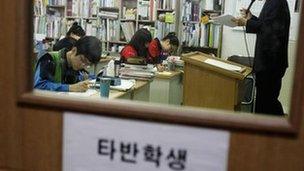Warning over world schools rankings
- Published

Asian countries such as South Korea have led the international rankings
International league tables do not give the whole picture of England's schools, a professor of education says.
Global rankings can be misleading and give an inconsistent view of how well an education system is performing, according to a study.
Prof Alan Smithers, of Buckingham University, says England's rankings vary for various reasons.
He said one recent table appeared to show England's schools were slipping, while another suggested the opposite.
Prof Smithers examined a number of international rankings, such as the Pisa survey, which looks at maths, science and reading levels among 15-year-olds; Timms, which analyses performance in maths and science at ages nine to 10 and 13-14, and Pirls which looks at reading among 10-year-olds.
The last Pisa study appeared to show England's performance had worsened, the study said, while Timms suggested the opposite.
Some nations may take part in one international survey, but not in another, the study said, and a lot of emphasis can be placed on small differences between countries' test scores.
And the surveys might test different aspects of literacy, numeracy and science, it added.
The report concluded: "England's position in international education league tables depends on which other countries take part and what is taken into account."
Cultural attitudes
Prof Smithers said there was a group of countries and territories that generally performed better than England in all tables, including Hong Kong, Japan, Singapore and Taiwan.
"These league tables are designed to enable education systems to be compared, and it is easy to assume that any differences in pupil performance are due to the education system," he said.
"But this is not necessarily the case."
The report was commissioned by the Sutton Trust educational charity.
The charity's chairman Sir Peter Lampl said the strong performance of some Asian countries could reflect cultural differences, adding that Chinese students often outperformed their classmates in Britain too.
But he said that these countries also "set the pace in the global economy too" and there was a need "to see whether we can learn from them so we can compete more successfully as a nation".
- Published11 December 2012
- Published27 November 2012
- Published9 May 2012